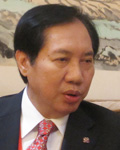| Given the ongoing maritime disputes between China and some Southeast Asian countries, how do people from the region view the current state of their countries' relations with China and the role it plays in promoting common regional development?
During the China-Southeast Asia High-Level People-to-People Dialogue, held from June 3-5 in Nanning, capital of south China's Guangxi Zhuang Autonomous Region, several participants shared their views with Beijing Review. Excerpts follow:

Ferdinand Marcos Jr. (Philippine Senator): I think it is very clear to all observers—not only in Southeast Asia or Asia, but even in the global context—that it is necessary for China to be part of any development that will be enjoyed by the region. The region cannot plan and cannot continue to operate without involving China, and it will play a key role in the development of the region, not only in economic terms but also in political and cultural terms. The important role that China plays is recognized by all its neighboring countries.
Although we've sometimes found ourselves at an impasse when it comes to government-to-government relationships, especially about maritime disputes, the relationship still continues to be strengthened and developed through other sector exchanges. And there are many areas that have great potential. Of course there are always increasing trade, cultural exchanges, educational exchanges and tourism. There are many sectors we should explore. We should not limit ourselves merely to debate over conflicting claims ASEAN countries and China have on certain islands and sea lanes.
We have to admit that the conflicts are at the forefront now, rather than parallel interests our countries have. It is a point of some sadness and concern that the relationship has taken this turn. We must take active measures to promote other areas of communication and exchanges. In that way, we can redefine our relationship and perhaps begin to move away from merely talking about maritime conflicts and start developing relationships aside from that. I think we are able to do that. I am certain it may even help the discussions between our countries concerning those rather difficult issues we are facing now.
I believe that our two countries must agree on a mechanism to first take a step back and cool the present situation. We must agree on a framework method that is agreeable to both countries to move the discussions forward to arrive at a true and permanent resolution of the problem.

Phokin Phalakul (Former President of the National Assembly and Speaker of the House of Representatives of Thailand): China and ASEAN nations have contributed a lot to each other in their development as they have been enjoying a longtime friendship. China is a big country and has much valuable experience for ASEAN nations. ASEAN has provided a peaceful neighboring environment for development. Southeast Asian countries have a shared dream with China: peace and prosperity. Southeast Asian countries are willing to work with Chinese people to realize this shared dream.
People do not want war. From China to Thailand and ASEAN countries, without any boundaries, this is the will of people in general. So if you respect the will of the people—of course you have to have discipline, rules and regulations—you can make the dreams come true. That's why I don't see any problems that cannot be resolved between China and some ASEAN nations. If we don't go too far in the direction of "nationalism," I think things can be discussed and negotiated. I think dialogue is more important than discussion. Because in discussions sometimes you think you want to persuade the other, you want the other to listen only to you. But dialogue means you have to listen to each other, try to understand each other, bring neutral solutions and then follow them.
I think the United States just wants to block some big countries like China from expanding military power. But I notice U.S. President Barack Obama doesn't want war or confrontation. You can see that China cooperates closely with the U.S. Government. The United States thinks democracy can help the Western world put resistance on China. But China is so wise to say, "I can go with any country, because our dream is peace and harmony, even though we are different in system from your government." And with this kind of gesture and attitude of both countries, I think the two big powers can bring peace to the whole world.
| 